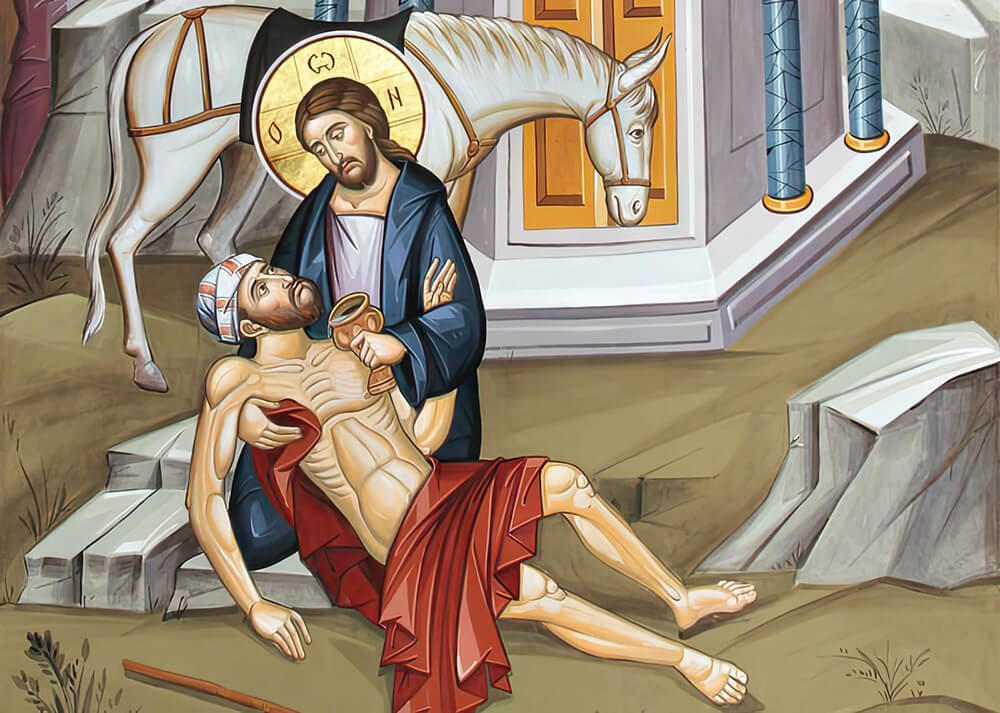
The spiritual evening of June took place, as usual, on the monastery’s YouTube channel. The central topic was the parable of the Good Samaritan (Luke 10:25-37).
The classical explanation of the parable comes from Origen, the third-century exegete: “The man descending was Adam. Jerusalem is heaven, while Jericho is the world. The robbers are the powers that war against us. The priest is the Law, the levite symbolizes the prophets, and the Samaritan is Christ. The wounds are from disobedience. The donkey is the body of Christ. The guest house, which receives every man who desires to enter, is the Church. The two denarii symbolize the Father and the Son. The host is the head of the Church, to whom this is entrusted. The fact that the Samaritan promises that He will return represents the Lord’s second coming. The Samaritan, who showed mercy upon the man who fell among robbers, is truly a protector and a closer neighbor that helps more readily than the Law and the prophets. Christ showed us that He was the neighbor of the man who fell among robbers through deeds rather than through words.”
Therefore, the Lord personally approaches each of us, He gives us a few words, He comforts us, and then leaves us to the care of the Church, of her spiritual fathers. This parable speaks perfectly about the Lord, but also about how He wants each of us to be, with this type of spontaneous and natural kindness, like we often see in mothers. A mother doesn’t stop to think when her children are in danger, but she jumps immediately to help them. This is the impulse of a loving heart.
Alongside this kindness, the Lord also restores us. Alexandru Mironescu, former chemistry professor and researcher in interwar Romania, member of the “Burning Bush” movement who was imprisoned together with its other members, captures this image of the Lord in the essay Sine intermissione orate, 17 august 1970 from his book “The path of the heart. Essays in the spirit of the Burning Bush”:
“Christ in the gospels, according to my current sensibility and understanding, heals, cures, restores, never crying in a sterile way, but acts, and even to the infirm man who was waiting 38 years in the pools of Bethesda, He doesn’t say words like this: ‘Woe, woe to you, poor man, you’ve been waiting bitterly long and haven’t found anyone to have compassion on you, ah, the evil of men!…’ etc., banal and betraying an unfruitful and worthless generosity. Christ prays, works, builds up, fulfills with a gesture, a deed, a word. No one, coming into contact with Him, leaves without some benefit and He does not shy away from anyone. Christ is not a moralizer, but a restorer of our entire nature, destined for fulfillment in eternal life.”
This is the image we see fulfilled in the Good Samaritan. Due to our wounds, we lose ourselves in an unending series of questions and we can’t muster the dignity to raise ourselves above. But the Lord’s spirit is different, namely: “If you want to be healthy, it’s possible now, because I am with you.” The past doesn’t matter, everything from here forward helps me to have a plenary relationship with the Lord, to heal my wounds. The Lord does not abolish evil, but He restores it. This is what we should focus on, otherwise we lose a lot of energy. Our striving should be centered on Christ, to have this trust in Him that any wound can be healed at His feet. I have a Samaritan who can help me, no matter what happens.
And because the parable of the Good Samaritan is the parable of the universal heart, which encompasses all, which loves everyone, it is important to learn from it how we should relate to our neighbor. But it’s not easy. Saint Paisios makes a very good diagnosis: “In this battle, many of our brethren are fallen to the ground, covered with wounds, full of blood, and there is no one to attend to them: neither layman, nor priest, no one; because we each think only about ourselves. Thus, we all drown. We are only strong, we are only conquerors, when we don’t seek our self-interest. Now, however, we are weak and we are conquered easily by people and by the devil, because we seek only our self-interest, because we don’t defend one another, nor do we strengthen ourselves with divine love, but we seek other bases for friendship: nationality, habit, coworkers, neighbors; any basis except our faith in God; but really only faith in God should unite friends. But exactly the opposite happens; we are friends with Jews and pagans, but we are not friends with the children of the Church.”
It’s only when we truly entrust ourselves to God and we forget about ourselves, only then do we have eyes to see around us and how much help is needed. And then, when we concern ourselves more with the others than with ourselves, our problems also get solved. Therefore, we need to change this and to allow ourselves to be restored by the Lord through His kindness and love for mankind.
